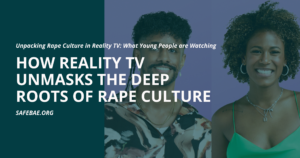How Reality TV Unmasks the Deep Roots of Rape Culture
Unpacking Rape Culture in Reality TV: What Young People are Watching
Reality TV provides a unique, unfiltered glimpse into human behavior, offering a stage where raw emotions and interactions unfold in real time. Unlike scripted shows, these moments aren’t carefully crafted by writers—they’re genuine reflections of how people interact in everyday life. When we watch these shows, particularly those centered on dating and relationships, we see more than just the drama and entertainment. We get a rare view of how deeply ingrained rape culture is in our society, manifesting in subtle, normalized behaviors that often fly under the radar.
The brilliance—and danger—of reality TV is that it holds up a mirror to our culture, showing us the good, the bad, and the deeply problematic. These shows don’t set out to promote harmful behavior, but they inadvertently reveal just how embedded coercion, entitlement, and blurred lines of consent are in everyday interactions. When real people participate in these programs, their actions reflect the norms they’ve absorbed over time—norms that often perpetuate harmful narratives about gender, power, and intimacy.
What’s most alarming is that these behaviors are not typically framed as malicious or predatory. Often, they come from well-meaning individuals who likely don’t even realize the harm in their actions. But that’s the insidious nature of rape culture: it’s woven so tightly into the fabric of society that what should be red flags are often dismissed as harmless banter or playful flirtation. These shows—watched by millions—reinforce the idea that certain behaviors, like pushing boundaries or feeling entitled to intimacy, are normal or even acceptable, further perpetuating the cycle.
This raw, unedited exposure to human behavior invites us to recognize just how pervasive these dynamics are. When we see coercive behavior, dismissive attitudes toward consent, or entitlement to intimacy playing out in real-time, it’s a stark reminder that rape culture isn’t just something we read about in think pieces—it’s happening all around us, often in plain sight. The fact that these moments are broadcast as entertainment underscores how desensitized we’ve become to these harmful dynamics, which makes it all the more crucial to call them out and shift the narrative.
“Coercion Disguised as Playfulness: The Christine and Kaz Moment in Perfect Match“
In Perfect Match, we witness a moment between Christine and Kaz where Christine persistently tries to persuade Kaz to kiss her. At first glance, this might seem like playful flirtation—after all, it’s a reality TV game show where romance is part of the premise. However, it highlights a deeper issue: coercion and how easily it’s disguised as innocent fun. Kaz never outright says “no,” but instead says, “I would, but I’m not that type of person,” indicating his clear boundary based on personal values and his loyalty to another contestant, Micah.
Christine’s response, however, is to persistently push Kaz to kiss her, despite his clear attempt to express his discomfort and boundary. This taps into a common trope in media—that when men hesitate, they’re just “playing hard to get,” and that persistence from a woman is a playful or even romantic challenge. What’s overlooked is that Kaz’s statement is, in fact, a full sentence, a boundary that deserved respect.
This scenario reveals how society tends to normalize pushing past someone’s reluctance, particularly when the initiator is a woman and the one being pursued is a man. In many ways, Christine’s actions play into the harmful idea that men must be persuaded or that their reluctance is something to be overcome, rather than respected. Despite Kaz expressing his discomfort, Christine’s persistence continues—highlighting how easily coercion can slip under the radar when it’s framed as part of flirtation or a “game.”
Consent isn’t just about getting a “yes” or avoiding a direct “no”; it’s about listening, understanding body language, and respecting someone’s boundaries when they communicate them—even if indirectly. In this moment on Perfect Match, what could have been a playful interaction became uncomfortable because Kaz’s boundaries were repeatedly disregarded. It reflects how deeply normalized it is to view reluctance as something that can be changed with enough persistence—a key component of rape culture that’s often dismissed as harmless.
Progressive on the Surface, Problematic in Practice: Marissa and Ramses on Love is Blind
In the latest season of Love is Blind, the relationship between Marissa and Ramses provides an insightful look into how even those who outwardly present themselves as progressive can still exhibit behaviors rooted in rape culture. Ramses, who portrays himself as an open-minded, progressive man, engages in behaviors that contradict the allyship he outwardly claims to embody—specifically around issues of consent and bodily autonomy. This contradiction is crucial to highlight because it demonstrates how deeply ingrained these behaviors are, even among those who may believe they’re above perpetuating them.
A pivotal moment occurs after a night where Marissa, visibly tired from commuting and work, mentions that she isn’t in the mood for sex and is on her period. We don’t see the full conversation unfold in the bedroom; however, the next morning, Marissa is clearly upset as they discuss what happened the night before. Ramses raises concerns about their sexual compatibility, framing her lack of desire as a potential problem in the relationship. While not overtly aggressive, his persistence pressures Marissa into feeling guilty for setting a boundary, which is a reflection of how subtle coercion can operate in intimate relationships.
What’s especially troubling is how men like Ramses, who often parade their progressive values, may only do so when it benefits them. While he is quick to promote his liberal ideals publicly, his personal actions, particularly around consent and bodily autonomy, tell a different story. This moment highlights how men like Ramses may wear the mask of progressivism as long as it aligns with their desires, but when their personal comfort or pleasure is challenged, those values fall away. Ramses’ concerns about Marissa’s lack of interest in sex subtly push her toward prioritizing his needs, showcasing the ways in which coercion and pressure can be masked as concern or “compatibility issues.”
Their conversation about birth control further exposes this hypocrisy. When Marissa expresses that she doesn’t want to be on birth control due to its impact on her body, Ramses responds by focusing on his dissatisfaction with condoms, complaining that they reduce his pleasure. While Marissa is explaining the significant physical toll birth control takes on her, Ramses shifts the conversation to his own discomfort, downplaying her concerns and reinforcing the prioritization of male pleasure over female autonomy.
This dynamic reveals a broader issue within rape culture—one where men, even those who identify as allies, may unconsciously perpetuate harmful norms when it serves their interests. Ramses’ concerns about his sexual pleasure highlight how deeply ingrained these behaviors are, even in men who claim to support bodily autonomy. It demonstrates how performative progressivism, where one’s actions don’t align with their outward persona, can be just as harmful as outright regressive behavior. It’s not enough to be an ally when it’s convenient; true allyship requires consistently prioritizing a partner’s boundaries and comfort, even at the cost of personal satisfaction.
By showcasing Marissa and Ramses’ dynamic, Love is Blind offers a powerful example of how societal norms around sex and consent continue to play out in relationships—often in ways that are overlooked or dismissed. It underscores the need for ongoing education around consent, bodily autonomy, and the importance of respecting a partner’s boundaries, even in the most subtle of situations.
Creating a Culture of Consent Through Education and Open Conversations
As teens and young adults binge reality shows like Perfect Match and Love is Blind, they are absorbing not just entertainment but real, unfiltered dynamics that often reflect deeply ingrained elements of rape culture. The moments of coercion, pressure, and disregard for boundaries, while portrayed as drama or humor, send harmful messages that normalize these behaviors. This makes it more important than ever to teach young people how to identify and challenge these harmful norms in their own lives.
At SafeBAE, we are committed to addressing these issues head-on with the younger generation. By providing tailored, peer-led education, we empower students to not only recognize harmful behaviors they encounter in media, but also to advocate for themselves and others in relationships. Reality TV is a reflection of real-life interactions, and it is crucial for teens and young adults to learn how to navigate these dynamics with respect, consent, and understanding.
Through ongoing education, SafeBAE equips students with the tools they need to understand consent, recognize manipulation, and promote healthier, more respectful relationships. We encourage students to become peer educators, creating an ongoing ripple effect that helps reshape the way their communities view consent and relationships.
By integrating these conversations into schools, youth groups, and community settings, we aim to create long-lasting change. If you’re interested in how SafeBAE can bring this vital education to your school or community, reach out to us today at shael@safebae.org. Together, we can foster a future where consent and mutual respect are the norm, not the exception.


